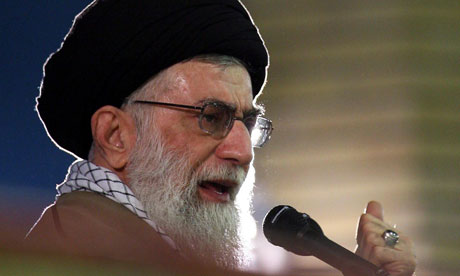Iran and Syria have long been allies, yet as if Khameni realises Assad's situation is not salvageable, he will abandon him
By Meir Javedanfar

-Meir Javedanfar is an Iranian-Israeli Middle East analyst and co-author of The Nuclear Sphinx of Tehran: Mahmoud Ahmadinejad and the State of Iran
By Meir Javedanfar

Iran's supreme leader, Ayatollah Ali Khamenei, has been a steadfast friend of Syria's Bashar al-Assad. Photograph: Rouzbeh Jadidoleslam/AP
For President Bashar al-Assad, the situation in Syria is becoming worse every day. In the middle of the biggest crisis his regime has faced, he has had one friend on whom he could rely: Iran's supreme leader, Ali Khamenei.
Khamenei has been Assad's steadfast friend, providing him with political as well as material support. But as Assad's position worsens, he will need to rely on Khamenei's regime more, especially since an increasing number of Assad's neighbours are turning against him.First was Turkey, which used to be a close ally. Now, the Turkish government is putting pressure on Assad and warning him to stop killing demonstrators and to implement reforms as soon as possible. And then the Saudis joined in by telling Assad to stop "his killing machine" and withdrawing their ambassador. A number of other Gulf states followed suit.
Assad has good reason to rely on Khamenei. The two regimes have been allies for many years. They have common interests with regard to Israel, Palestine, and groups such as Hezbollah and Hamas. In fact Assad would be right to assume that the Iranian government owes his family. While most of the Middle East backed Iraq in its eight-year war against Iran, it was Bashar's father, Hafez al-Assad who stood against the tide.Despite the closeness between the two leaders and the regimes, Syria's president should be under no illusion: Ali Khamenei is his friend, but he will not sink with Assad's ship. The moment the Iranian leader realises that Assad's situation is not salvageable, he will leave him. This will most probably be done privately. In public, Khamenei and the rest of the Iranian regime will continue their support. They may even offer Bashar refuge in Iran. But, behind the scenes, it would be another story.
The reason is very simple: many have said that the Iranian regime is extremist. This is true. It is extremist about its own wellbeing. To Khamenei there is nothing more important and sacred than this. He is ready to sacrifice anything that would pose a risk to it – including Bashar al-Assad. And one day, if the political and economic costs of Iran's nuclear programme start threatening the regime's stability and interests, he would give that up too.Khamenei will not commit political suicide by staying with Assad until the last moment. Doing so would be very damaging for the regime's interests. Iran is becoming more isolated every day. It does not need a new enemy in Damascus in the event of Assad's fall, especially when this could impact on its ability to supply weapons to Hezbollah through Syrian territory (not to mention relations with Hamas and Islamic Jihad, which it conducts through its offices in Damascus). It could also lose access to its economic interests in Syria.
These interests are all important to Khamenei, and he will want to protect them. Therefore Assad should not be surprised if one day he finds that, while Iran supports him publicly, behind the scenes its leaders are anticipating his demise by cavorting with members of the Syrian opposition.For now, we don't know if the Iranian government is doing this but the noted change in Iran's English-language government press – especially since the clashes started in Homs province – may indicate how things inside Iran's corridors of power are changing.
At an official level, the state-owned PressTV continues to support Assad's regime. PressTV has been full of reports about demonstrators being backed by foreign powers (Israel, the UK and the US are the usual suspects). However, after the clashes started in Homs, PressTV also started reporting Syrian forces firing on crowds, as well as quoting human rights activists who openly state that the Syrian army has been attacking civilians.When the protests in Syria first broke out many Persian media outlets in Iran stayed mute on the demonstrations. However, these days they are not only reporting on them but many are openly critical of Assad – much more than the English-language government-owned press.
A good example appeared on 28 July in the Jomhouri Eslami newspaper, a publication which has been close to Khamenei over the years. In an article headed "Assad's salvation is in reforms and not in the barrel of the guns", it said:"A question which Assad and his advisers have to answer is: how long can they continue with armed confrontation and violence? Can they use more violence than Gaddafi and bombard demonstrators like him? Did Gaddafi's use of violence return the people to their homes?"
The article went on to say that the Syrian army had killed hundreds in the cities of Dera'a and Homs. This is a far cry from the early days of the Syrian uprising when civilian casualties were ignored, while news agencies such as Mehr reported on "millions of demonstrators" supporting Assad.According to Masoud Adrisi, Iran's former ambassador to Lebanon, Hassan Nasrallah, the leader of Hezbollah, has now changed his position and is asking Assad to respond to his population's demands. The change in tone of reports from Iran could indicate that Khamenei is following Nasrallah, albeit at a slower pace. Sometimes a teacher can learn from his student.
-This commentary was published in The Guardian on 13/08/2011-Meir Javedanfar is an Iranian-Israeli Middle East analyst and co-author of The Nuclear Sphinx of Tehran: Mahmoud Ahmadinejad and the State of Iran
No comments:
Post a Comment